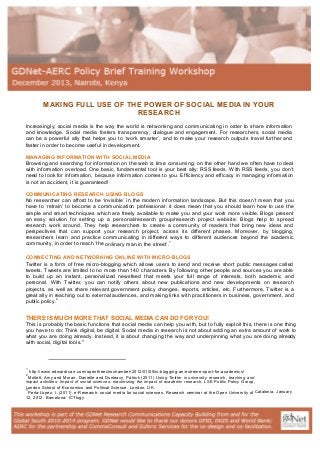
Social media for research
- 1. MAKING FULL USE OF THE POWER OF SOCIAL MEDIA IN YOUR RESEARCH Increasingly, social media is the way the world is networking and communicating in order to share information and knowledge. Social media fosters transparency, dialogue and engagement. For researchers, social media can be a powerful ally that helps you to ‘work smarter’, and to make your research outputs travel further and faster in order to become useful in development. MANAGING INFORMATION WITH SOCIAL MEDIA Browsing and searching for information on the web is time consuming; on the other hand we often have to deal with information overload. One basic, fundamental tool is your best ally: RSS feeds. With RSS feeds, you don’t need to look for information, because information comes to you. Efficiency and efficacy in managing information is not an accident, it is guaranteed! COMMUNICATING RESEARCH USING BLOGS No researcher can afford to be ‘invisible’ in the modern information landscape. But this doesn’t mean that you have to ‘retrain’ to become a communication professional: it does mean that you should learn how to use the simple and smart techniques which are freely available to make you and your work more visible. Blogs present an easy solution for setting up a personal/research group/research project website. Blogs help to spread research work around. They help researchers to create a community of readers that bring new ideas and perspectives that can support your research project, across its different phases. Moreover, by blogging, researchers learn and practice communicating in different ways to different audiences beyond the academic community, in order to reach ‘the ordinary man in the street’.1 CONNECTING AND NETWORKING ONLINE WITH MICRO-BLOGS Twitter is a form of free micro-blogging which allows users to send and receive short public messages called tweets. Tweets are limited to no more than 140 characters. By following other people and sources you are able to build up an instant, personalized newsfeed that meets your full range of interests, both academic and personal. With Twitter, you can notify others about new publications and new developments on research projects, as well as share relevant government policy changes, reports, articles, etc. Furthermore, Twitter is a great ally in reaching out to external audiences, and making links with practitioners in business, government, and 2 public policy. THERE IS MUCH MORE THAT SOCIAL MEDIA CAN DO FOR YOU! This is probably the basic functions that social media can help you with, but to fully exploit this, there is one thing you have to do: Think digital, be digital. Social media in research is not about adding an extra amount of work to what you are doing already. Instead, it is about changing the way and underpinning what you are doing already 3 with social, digital tools. 1 http://www.edwardrcarr.com/opentheechochamber/2012/01/05/is-blogging-an-extreme-sport-for-academics/ Mollett, Amy and Moran, Danielle and Dunleavy, Patrick (2011) Using Twitter in university research, teaching and impact activities. Impact of social sciences: maximizing the impact of academic research, LSE Public Policy Group, London School of Economics and Political Science. London, UK. 3 Peña-López, I. (2011). e-Research: social media for social sciences. Research seminar at the Open University of Catalonia. January 12, 2012. Barcelona: ICTlogy. 2
